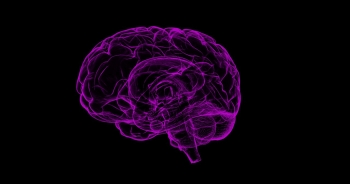News
Latest News List

COVID and your gut: how a healthy microbiome can reduce the severity of infection – and vice versa
COVID infection could affect the balance of bacteria in the gut, which might go some way to explaining why some people have persistent symptoms after a COVID infection.

Some guts are better than others at harvesting energy, study shows
The research is a step towards understanding why some people gain more weight than others, even when they eat the same foods.

Fatty liver disease endangers brain health
Cutting down the amount of sugar and fat in our diets is not only important for tackling obesity, but also for protecting the liver to maintain brain health and minimise the risk of developing conditions like depression and dementia during ageing.

Does diabetes during pregnancy increase the risk of neurodevelopmental conditions in children?
New research has revealed a link between maternal diabetes during pregnancy and a range of neurodevelopmental conditions in children - including autism, ADHD and epilepsy

Common food dye can trigger inflammatory bowel diseases, say researchers
Allura Red directly disrupts gut barrier function and increases the production of serotonin, which subsequently alters gut microbiota composition leading to increased susceptibility to colitis.
Delays to UK food advertising regulations condemned as unjustified, disastrous attack on health
"This is a disastrous and totally unjustifiable level of delay, and it is wrong to claim that industry has not had enough time to prepare, as the consultations took place in 2019, and the decision to introduce the 9pm watershed and online advertising restrictions announced in 2020"

Picky eater? Research shows it could be in your DNA
These findings shed a new light on our understanding of people’s food choices. If you understand why you don’t like certain foods it may help you improve the way you cook or prepare them.

People can have food sensitivities without noticeable symptoms – long-term consumption of food allergens may lead to behaviour and mood changes
Food allergens can affect the brain and behaviour of seemingly asymptomatic people, making them not so asymptomatic neurologically. Considering how your brain responds to the food you eat puts a whole new meaning to the phrase “you are what you eat.”

Adults' interactions at mealtimes influence children's future relationships with food
Adults guide the mealtime atmosphere with attitudes they bring to the family table, even when they do not realize it. Staying positively involved with their children throughout family meals can make lasting differences.

Netflix psychiatrist Phil Stutz says 85% of early therapy gains are down to lifestyle changes. Is he right?
"When I was a kid, exercise and diet was framed to me in like, ‘there’s something wrong with how you look’. But never once was exercise or diet propositioned to me in terms of mental health. I just wish that was presented to people differently. Because for me, that caused a lot of problems."

3 Outstanding Food Swaps to Improve Brain Health
What we eat plays a significant role in our overall health, especially brain health - here are three easy ways to sub out dietary junk in favour of healthier alternatives for your brain.

Residue from rinse agents used in commercial dishwashers found to destroy protective layer in gut
Strong toxic and epithelial barrier-damaging effects were elicited by residue from rinse agents which are commonly used in professional dishwashers.

Gut microbes influence binge-eating of sweet treats in mice
Could specific gut bacteria suppress binge eating behaviour?

Obesity linked to poor brain health in children
"Our study showed that higher weight and BMI z-scores in 9- and 10-year-olds were associated with changes in macrostructures, microstructures and functional connectivity that worsened brain health."

We’re told to ‘eat a rainbow’ of fruit and vegetables. Here’s what each colour does in our body
Nutritionists will tell you to eat a rainbow of fruit and vegetables. Each colour signifies different nutrients our body needs. So what does each colour do for our body and our overall health?

Believe it or 'nut,' almonds can help you cut calories
Weight loss is never an easy nut to crack, but a handful of almonds could keep extra kilos at bay according to new research.

Obesity medicine expert discusses the connection between metabolism and mental health
Growing evidence points to a connection between mental illness and altered metabolism in the brain; thus, treatment addressing this dysfunction may improve patient outcomes.
Webinar - Smarter Food, Smarter Kids - Resolving the Attention Deficit Disaster
Dr Alex Richardson discusses that latest scientific research on how to help children focus, stay engaged and accelerate learning with a clear mind and good mood.

Highly processed foods can be considered addictive like tobacco products, study claims
"It is time to stop thinking about highly processed foods just as food, but instead as highly refined substances that can be addictive,"

Kids and sodium: Serious risks, alarming realities
Roughly 1 in 6 children have high blood pressure during childhood, which remains a major risk factor for heart disease and stroke.
- <
- 1
- 2
- 3
- 4
- 5
- 6
- 7
- 8
- 9
- 10
- 11
- 12
- 13
- 14
- 15
- 16
- 17
- 18
- 19
- 20
- 21
- 22
- 23
- 24
- 25
- 26
- 27
- 28
- 29
- 30
- 31
- 32
- 33
- 34
- 35
- 36
- 37
- 38
- 39
- 40
- 41
- 42
- 43
- 44
- 45
- 46
- 47
- 48
- 49
- 50
- 51
- 52
- 53
- 54
- 55
- 56
- 57
- 58
- 59
- 60
- 61
- 62
- 63
- 64
- 65
- 66
- 67
- 68
- 69
- 70
- 71
- 72
- 73
- 74
- 75
- 76
- 77
- 78
- 79
- 80
- 81
- 82
- 83
- 84
- 85
- 86
- 87
- 88
- 89
- 90
- 91
- 92
- 93
- 94
- 95
- 96
- 97
- 98
- 99
- 100
- 101
- 102
- 103
- 104
- 105
- 106
- 107
- 108
- 109
- 110
- 111
- 112
- 113
- 114
- 115
- 116
- 117
- 118
- 119
- 120
- 121
- 122
- 123
- 124
- 125
- 126
- 127
- 128
- 129
- 130
- 131
- 132
- 133
- 134
- 135
- 136
- 137
- 138
- 139
- 140
- 141
- 142
- 143
- 144
- 145
- 146
- 147
- 148
- 149
- 150
- 151
- 152
- 153
- 154
- 155
- 156
- 157
- >
